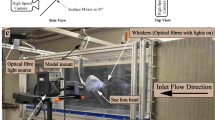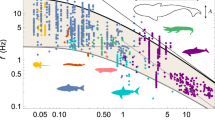Abstract
IT was noticed during a series of experiments dealing with the functional capacity of the salt gland of sea-gulls that an increase in secretion rate was occasionally associated with ‘alertness’ caused by distant moving objects or from sudden noises.
This is a preview of subscription content, access via your institution
Access options
Subscribe to this journal
Receive 51 print issues and online access
$199.00 per year
only $3.90 per issue
Buy this article
- Purchase on Springer Link
- Instant access to full article PDF
Prices may be subject to local taxes which are calculated during checkout
Similar content being viewed by others
References
McFarland, L. Z., Nature, 204, 1202 (1964).
Fange, R., Schmidt-Nielsen, K., and Robinson, M., Amer. J. Physiol., 195 321 (1958).
Schmidt-Nielsen, K., Circulation, 21, 955 (1960).
Author information
Authors and Affiliations
Rights and permissions
About this article
Cite this article
McFARLAND, L. Influence of External Stimuli on the Secretory Rate of the Avian Nasal Salt Gland. Nature 205, 391–392 (1965). https://doi.org/10.1038/205391a0
Published:
Issue Date:
DOI: https://doi.org/10.1038/205391a0
Comments
By submitting a comment you agree to abide by our Terms and Community Guidelines. If you find something abusive or that does not comply with our terms or guidelines please flag it as inappropriate.



